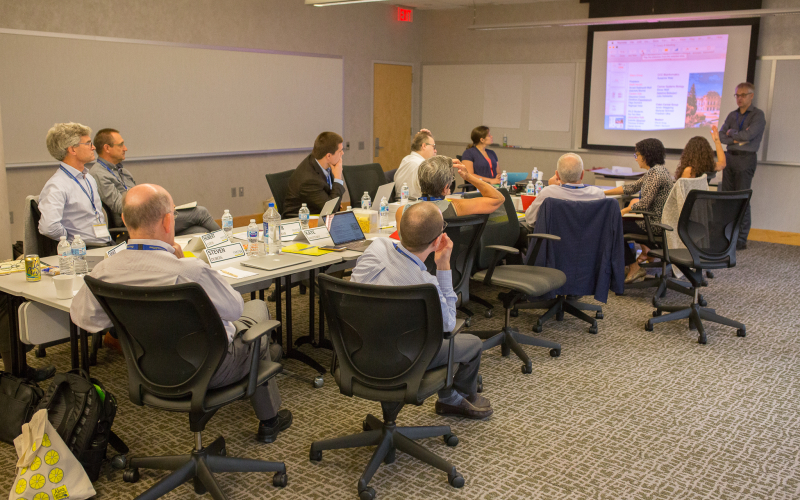
Above, Martin Eilers, PhD from the University of Würzburg in Germany, shares his work on "Drugging MYCN" at a Crazy 8 meeting in Philadelphia. “It’s really pioneering work,” said Eilers
By: Trish Adkins
Martin Eilers, PhD estimates that his lab at the University of Würzburg in Germany has exchanged over 300 drug candidates across the Atlantic Ocean with labs in the United States.
“It’s a very intense, day-to-day collaboration,” said Eilers, who is part of the Alex’s Lemonade Stand Foundation (ALSF) Crazy 8 team studying the drugging of oncogene MYCN. Often thought of as undruggable, MYCN not only drives the development of childhood cancers like neuroblastoma and medulloblastoma, but it is also a marker of a poor prognosis. It is part of the larger MYC family of oncogenes, which researchers estimate appear in 70-percent of all human cancers.
The team is led by Dr. Yael Mossé, at Children’s Hospital of Philadelphia. In addition to Philadelphia and Germany, there are team members in Boston, Memphis and San Francisco. Together, they are developing drug candidates that can attach to the oncogene, trick the cancer cells to attack and dissolve MYCN, leading to the death of the cancer cell. It’s a lofty goal, one that Mossé calls the “holy grail of pediatric cancer drug development.” 
“It’s really pioneering work,” said Eilers. And while the researchers are in Germany and the United States, this work could lead to breakthroughs that reverberate throughout the world. As the team studies and learns more about MYCN and drug candidates, they compile data, which leads to findings, which can lead to publishing in high impact journals. This publishing not only inspires scientists all around the world to think more about MYCN, but it also energizes them, growing the body of knowledge and leading to more studies and hopefully, more cures for kids with cancer, everywhere.
There are over 400,000 kids diagnosed with childhood cancer each year. This worldwide number is most likely low — due to underreporting and a lack of a comprehensive global childhood cancer registry. In the United States, childhood cancer is the leading cause of death by disease, but still has an overall five-year survival rate of 80%. In low- and middle-income countries, the picture is flipped: nearly 80% of children with cancer die within five years of diagnosis.
The need for cures is urgent.
The Crazy 8 grant funding by ALSF is addressing that urgency by providing funding to international, collaborative teams that are studying the most unsolvable, previously impossible problems in cancer research. There are six teams in total with researchers from 21 institutions. Later this year, the Foundation will award another grant team that will study cancer predisposition, another pressing and challenging problem in pediatric oncology. Estimates of how many children have a predisposition to cancer vary — but at least 30% of children with cancer have some sort of predisposition to cancer whether the result of an inherited syndrome or a germline mutation.
The key to these teams’ success is in the collaboration. Teams are studying Ewing sarcoma and osteosarcoma, tracing the cellular origins and history of leukemia, employing molecular glues and cellular barcoding and collaborating, every day, for cures for all kids, no matter where they live. Eilers said his team makes it happen across oceans and continents and specialties and political boundaries. They meet regularly over Zoom, take advantage of in-person meetings coordinated by ALSF and trade data daily.
“If we can show that this research opens the pathway to finding new drugs, this would be an amazing achievement,” said Eilers.
Alex’s Lemonade Stand Foundation (ALSF) founder Alex Scott believed that if we all work together, we would find cures for childhood cancer. As researchers continue to move closer to cures for all children, there are still types of childhood cancer that continue to be incurable. To accelerate childhood cancer research, ALSF has developed the Crazy 8 Initiative, a $50 million commitment to solve the most intractable problems in childhood cancers. The $50 million will fund at least 10 game-changing collaborative projects that connect researchers across the globe. We have already raised and allocated the first $25 million toward six projects that are taking on the deadliest of childhood cancers with one singular focus: curing the incurable.
Donate to the Crazy 8 Initiative

